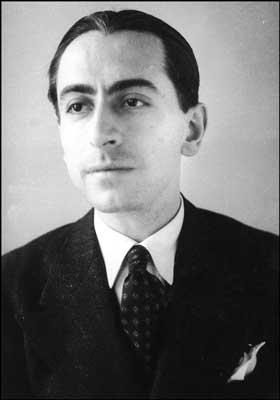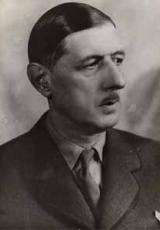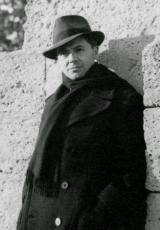Pierre Brossolette

Born into a staunchly Republican family, he pursued his studies in history. He achieved the top results in the entrance examination for the École Normale Supérieure in 1922 and the second highest results of his year in the high-level examination for recruiting teachers in 1925, but instead he opted for a career in journalism, notably writing for reviews such as 'Notre Temps', 'l'Europe Nouvelle' and 'Le Populaire', and participating in radio programmes (1936-1939). He specialised in analysing international politics. Like his father, he became a socialist and joined the SFIO (the French Section of the Workers' International) in 1930. He was fiercely opposed to the Munich Agreement in September 1938, which allowed the dismantling of Czechoslovakia, judging it to be dishonourable to the French nation, partisan of what he called 'the spirit of resistance', and he was expulsed from the national radio waves in February 1939 for voicing his opinion. The following September, he was posted as a lieutenant in the 5th Infantry Regiment. He fought bravely in June 1940, and was awarded the 'Croix de guerre'. On his return from the battlefield on 23 August 1940, he and his wife bought a bookstore situated in rue de la Pompe. It is there that he was contacted by Resistance fighters from the 'Musée de l'Homme' group during the winter of 1940-41.
Having become the main writer of the clandestine publication, the 'Bulletin officiel du Comité national de Salut public', he wrote every word of the last edition when the network was dismantled by the Gestapo. His work as a history teacher at the Collège Sévigné led to one of his colleagues putting him in touch with the intelligence network headed by Colonel Rémy, 'La Confrérie Notre Dame', and during the winter of 1941-1942, he used the pseudonym Pedro to organise contacts between 'Libération-Nord', 'Organisation Civile et Militaire' and 'la France Libre'. All these activities made him extremely knowledgeable about events in occupied France, and highly sought after by the intelligence network in London. At the end of the month of April 1942, he left for the English capital where he urged General de Gaulle to return to France to encourage eminent political personalities including Louis Vallon, André Philip and Charles Vallin to rally around 'la France Libre'. Commander Bourgat, as he was known in London, was awarded the honour of 'Compagnon de la Libération' on 17 October 1942 and he joined the French Resistance secret services before taking charge of the Operations Unit, the liaison between the interior and exterior Resistance fighters. Along with Passy, the head of the BCRA (Central Intelligence and Action Office), he was behind the 'Arquebuse' and 'Brumaire' missions, which were initiated at the start of 1943 to organise a coordination committee equivalent to that created by Jean Moulin in the unoccupied zone. This committee was created in March.
In April, he returned to London and to his work at the BCRA. In June-July, he presented the BBC TV programme entitled 'Honneur et Patrie'. In September, he was charged with installing the new representative of the CFLN for movements of interior Resistance, Émile Bollaert (to replace Jean Moulin who had been arrested on 21 June 1943), and to work on the future organisation of the press and radio following the Liberation of France. For three months, the two men tried to repair the damage done to the Resistance movement by the many arrests made during the summer and autumn. They were both called to London, and were arrested on arrival on 3 February 1944. Recognised and taken to the Gestapo headquarters in avenue Foch, Pierre Brossolette threw himself from a 5th floor window to avoid giving away secrets under torture. He died the same day, on 22 March 1944. This combatant of the shadows was without any doubt - to use his own expression - 'an unseen worker for glory'.



